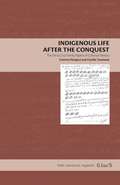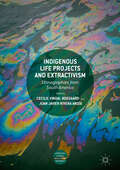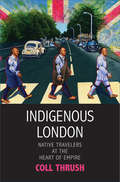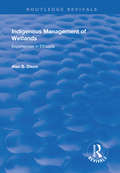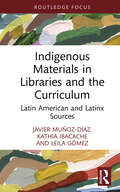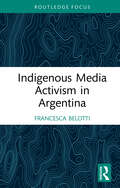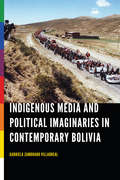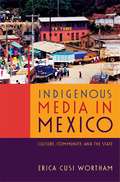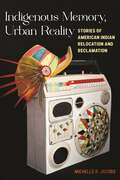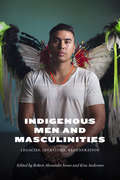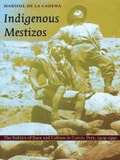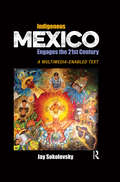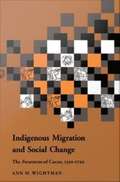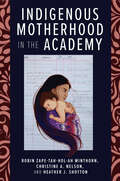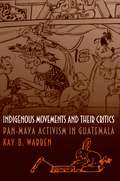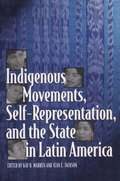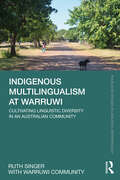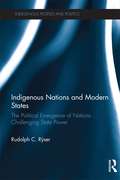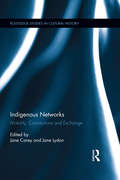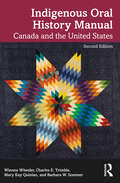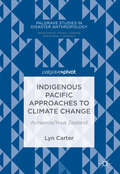- Table View
- List View
Indigenous Life After the Conquest: The De la Cruz Family Papers of Colonial Mexico (Latin American Originals #16)
by Camilla Townsend Caterina PizzigoniThis book presents a unique set of written records belonging to the De la Cruz family, caciques of Tepemaxalco in the Toluca Valley. Composed in Nahuatl and Spanish and available here both in the original languages and in English translation, this collection of documents opens a window onto the life of a family from colonial Mexico’s indigenous elite and sheds light on the broader indigenous world within the Spanish colonial system.The main text is a record created in 1647 by long-serving governor don Pedro de la Cruz and continued by his heirs through the nineteenth century, along with two wills and several other notable documents. These sources document a community history, illuminating broader issues centering on politics, religion, and economics as well as providing unusual insight into the concerns and values of indigenous leaders. These texts detail the projects financed by the De la Cruz family, how they talked about them, and which belongings they deemed important enough to pass along after their death. Designed for classroom use, this clear and concise primary source includes a wealth of details about indigenous everyday life and preserves and makes accessible a rich and precious heritage. The engaging introduction highlights issues of class relations and the public and performative character of Nahua Christianity. The authors provide the necessary tools to help students understand the colonial context in which these documents were produced.
Indigenous Life After the Conquest: The De la Cruz Family Papers of Colonial Mexico (Latin American Originals)
by Camilla Townsend Caterina PizzigoniThis book presents a unique set of written records belonging to the De la Cruz family, caciques of Tepemaxalco in the Toluca Valley. Composed in Nahuatl and Spanish and available here both in the original languages and in English translation, this collection of documents opens a window onto the life of a family from colonial Mexico’s indigenous elite and sheds light on the broader indigenous world within the Spanish colonial system.The main text is a record created in 1647 by long-serving governor don Pedro de la Cruz and continued by his heirs through the nineteenth century, along with two wills and several other notable documents. These sources document a community history, illuminating broader issues centering on politics, religion, and economics as well as providing unusual insight into the concerns and values of indigenous leaders. These texts detail the projects financed by the De la Cruz family, how they talked about them, and which belongings they deemed important enough to pass along after their death. Designed for classroom use, this clear and concise primary source includes a wealth of details about indigenous everyday life and preserves and makes accessible a rich and precious heritage. The engaging introduction highlights issues of class relations and the public and performative character of Nahua Christianity. The authors provide the necessary tools to help students understand the colonial context in which these documents were produced.
Indigenous Life Projects and Extractivism: Ethnographies from South America (Approaches to Social Inequality and Difference)
by Cecilie Vindal Ødegaard Juan Javier Rivera AndíaExploring indigenous life projects in encounters with extractivism, the present open access volume discusses how current turbulences actualise questions of indigeneity, difference and ontological dynamics in the Andes and Amazonia. While studies of extractivism in South America often focus on wider national and international politics, this contribution instead provides ethnographic explorations of indigenous politics, perspectives and worlds, revealing loss and suffering as well as creative strategies to mediate the extralocal. Seeking to avoid conceptual imperialism or the imposition of exogenous categories, the chapters are grounded in the respective authors’ long-standing field research. The authors examine the reactions (from resistance to accommodation), consequences (from anticipation to rubble) and materials (from fossil fuel to water) diversely related to extractivism in rural and urban settings. How can Amerindian strategies to preserve localised communities in extractivist contexts contribute to ways of thinking otherwise?
Indigenous London: Native Travelers at the Heart of Empire
by Coll ThrushAn imaginative retelling of London's history, framed through the experiences of Indigenous travelers who came to the city over the course of more than five centuries London is famed both as the ancient center of a former empire and as a modern metropolis of bewildering complexity and diversity. In Indigenous London, historian Coll Thrush offers an imaginative vision of the city's past crafted from an almost entirely new perspective: that of Indigenous children, women, and men who traveled there, willingly or otherwise, from territories that became Canada, New Zealand, Australia, and the United States, beginning in the sixteenth century. They included captives and diplomats, missionaries and shamans, poets and performers. Some, like the Powhatan noblewoman Pocahontas, are familiar; others, like an Odawa boy held as a prisoner of war, have almost been lost to history. In drawing together their stories and their diverse experiences with a changing urban culture, Thrush also illustrates how London learned to be a global, imperial city and how Indigenous people were central to that process.
Indigenous Management of Wetlands: Experiences in Ethiopia (Routledge Revivals)
by Alan DixonThis title was first published in 2003. There has been increasing recognition around the world that wetlands are fragile ecosystems which require sensitive and sustainable management if they are to continue to provide their range of functions and benefits. These functions and benefits, which include contributions to food security and environmental regulation, play a critical role in sustaining rural livelihoods in many developing countries. Drawing upon research carried out in the area, this book identifies and discusses the importance of wetlands to local communities in south-west Ethiopia, and in particular, how indigenous wetland management practices contribute to sustainable wetland use. As the basis of wetland management, particular attention is paid to the role of Indigenous Knowledge Systems, and how knowledge of wetland functioning is acquired, disseminated, developed and applied by local communities in their wetland management strategies. Critically, this community knowledge is examined in the context of scientific data, specifically that obtained from a wetland hydrology monitoring programme, thereby drawing attention to the strengths and weaknesses of both systems. This has major implications not only for the ways in which wetlands and other natural resources are managed at the local level, but also for the wider rural development strategies of governments and non-governmental organizations.
Indigenous Materials in Libraries and the Curriculum: Latin American and Latinx Sources
by Leila Gómez Javier Muñoz-Díaz Kathia IbacacheIndigenous Materials in Libraries and the Curriculum: Latin American and Latinx Sources argues for a decolonial engagement with Indigenous peoples’ creative work to build awareness of divergent epistemologies and foster healing in the learning community.This book explores how faculty and librarians can collaborate to develop inclusive library collections and curricula by supporting Indigenous peoples’ reclamation of lands and languages. The authors present practices to build and disseminate collections that showcase the work of Indigenous creators from Latin America and compensate for historical erasure and misrepresentation. Consideration is also given to developing a non-hegemonic curriculum in Indigenous languages and cultures for faculty and students from multicultural backgrounds, particularly Latinx students of Indigenous descent. Above all, the book aspires to facilitate the participation of Indigenous peoples in the scholarly conversation to counteract epistemic and material extractivism and transform the scaffolding of higher education in the current global climate crisis.Indigenous Materials in Libraries and the Curriculum is inspired by a transhemispheric vision to elicit conversation between Indigenous peoples from Latin America (Abiayala) and North America (Turtle Island). The book will appeal to academics, librarians, students, and activists interested in Indigenous languages and cultures, decolonization, DEI initiatives, and library collection development policies that prioritize non-hegemonic narratives.
Indigenous Media Activism in Argentina (Media and Communication Activism)
by Francesca BelottiExploring Indigenous activism through the lens of media practices, this book examines the Indigenous media that has emerged in Argentina since the introduction of legislation in 2009 intended to promote diversity and access in radio and television media production. Francesca Belotti provides insights into the political and cultural matrix, attitudes of resistance and empowerment, and the outward and inward direction of Indigenous activism by unpacking the media practices that unfold in Indigenous radio and television stations in Argentina. The theoretical framework combines studies on indigeneity, social/decolonial movements and media practices, and draws on interviews conducted with Indigenous media practitioners from different Indigenous populations around Argentina. The book examines how media practices can help support and sustain Indigenous political and cultural activism and the process of identity self-ascription. It also addresses the complex negotiation between indigenizing media and assimilating the mainstream, as well as coping with other practical constraints. This book will be of interest both to students and scholars of Indigenous Studies, Decolonial and Postcolonial Studies, Cultural Studies, Latin American Studies, Media Studies, and Social Movements, as well as media activists and practitioners globally.
Indigenous Media and Political Imaginaries in Contemporary Bolivia
by Gabriela Zamorano VillarrealGabriela Zamorano Villarreal examines the political dimension of indigenous media production and distribution as a means by which indigenous organizations articulate new claims on national politics in Bolivia, a country experiencing one of the most notable cases of social mobilization and indigenous-based constitutional transformation in contemporary Latin America. Based on fieldwork in Bolivia from 2005 to 2007, Zamorano Villarreal details how grassroots indigenous media production has been instrumental to indigenous political demands for a Constituent Assembly and for implementing the new constitution within Evo Morales's controversial administration. On a day-to-day basis, Zamorano Villarreal witnessed the myriad processes by which Bolivia’s indigenous peoples craft images of political struggle and enfranchisement to produce films about their role in Bolivian society. Indigenous Media and Political Imaginaries in Contemporary Bolivia contributes a wholly new and original perspective on indigenous media worlds in Bolivia: the collaborative and decolonizing authorship of indigenous media against the neoliberal multicultural state, and its key role in reimagining national politics. Zamorano Villarreal unravels the negotiations among indigenous media makers about how to fairly depict a gender, territorial, or justice conflict in their films to promote grassroots understanding of indigenous peoples in Bolivia’s multicultural society.
Indigenous Media and Popular Culture in the Philippines: Representations, Voices, and Resistance
by Jason Paolo TellesThis book argues that the production of media content, literature, and other forms of popular culture by Indigenous peoples (IPs), as well as their involvement as advisors, sources, or interviewees, serves as a platform for them not only to showcase their creativity but also to mediate their cultures, identities, worldviews, and activism. Through an examination of specific case studies of indigenous media and popular culture in the Philippines using textual and ethnographic methods, the chapters in this book shed light on the politics of representation, narratives of resistance, and self-representation and mediation of indigeneity and culture. They emphasize the crucial importance of addressing these issues to promote the recognition and empowerment of IPs, not only within the Philippines but also across Southeast Asia and the global context.
Indigenous Media in Mexico: Culture, Community, and the State
by Erica Cusi WorthamIn Indigenous Media in Mexico, Erica Cusi Wortham explores the use of video among indigenous peoples in Mexico as an important component of their social and political activism. Funded by the federal government as part of its "pluriculturalist" policy of the 1990s, video indígena programs became social processes through which indigenous communities in Oaxaca and Chiapas engendered alternative public spheres and aligned themselves with local and regional autonomy movements.Drawing on her in-depth ethnographic research among indigenous mediamakers in Mexico, Wortham traces their shifting relationship with Mexican cultural agencies; situates their work within a broader, hemispheric network of indigenous media producers; and complicates the notion of a unified, homogeneous indigenous identity. Her analysis of projects from community-based media initiatives in Oaxaca to the transnational Chiapas Media Project highlights variations in cultural identity and autonomy based on specific histories of marginalization, accommodation, and resistance.
Indigenous Memory, Urban Reality: Stories of American Indian Relocation and Reclamation
by Michelle R. JacobsContemporary accounts of urban Native identity in two pan-Indian communitiesIn the last half century, changing racial and cultural dynamics in the United States have caused an explosion in the number of people claiming to be American Indian, from just over half a million in 1960 to over three million in 2013. Additionally, seven out of ten American Indians live in or near cities, rather than in tribal communities, and that number is growing.In Indigenous Memory, Urban Reality, Michelle Jacobs examines the new reality of the American Indian urban experience. Drawing on ethnographic research conducted over two and a half years, Jacobs focuses on how some individuals are invested in reclaiming Indigenous identities whereas others are more invested in relocating their sense of self to the urban environment. These groups not only apply different meanings to indigeneity, but they also develop different strategies for asserting and maintaining Native identities in an urban space inundated with false memories and fake icons of “Indian-ness.” Jacobs shows that “Indianness” is a highly contested phenomenon among these two groups: some are accused of being "wannabes" who merely "play Indian," while others are accused of being exclusionary and "policing the boundaries of Indianness." Taken together, the interconnected stories of relocators and reclaimers expose the struggles of Indigenous and Indigenous-identified participants in urban pan-Indian communities. Indigenous Memory, Urban Reality offers a complicated portrait of who can rightfully claim and enact American Indian identities and what that tells us about how race is “made” today.
Indigenous Men and Masculinities: Legacies, Identities, Regeneration
by Richard Van Camp Lisa Tatonetti Kim Anderson Gregory Scofield Robert Alexander Innes Sam Mckegney Niigaanwewidam James Sinclair Brendan Hokowhitu Ty P. Tengan Warren Cariou Daniel Heath Justice Bob Antone Phillip Borell Kimberly Minor Scott L. Morgensen Robert Henry Allison Piché Sasha Sky Leah Sneider Erin Sutherland John Swift Lloyd L. Lee William Kahalepuna Richards Jr. Thomas Ka’auwai Kaulukukui Jr.What do we know of masculinities in non-patriarchal societies? Indigenous peoples of the Americas and beyond come from traditions of gender equity, complementarity, and the sacred feminine, concepts that were unimaginable and shocking to Euro-western peoples at contact. "Indigenous Men and Masculinities", edited by Kim Anderson and Robert Alexander Innes, brings together prominent thinkers to explore the meaning of masculinities and being a man within such traditions, further examining the colonial disruption and imposition of patriarchy on Indigenous men. Building on Indigenous knowledge systems, Indigenous feminism, and queer theory, the sixteen essays by scholars and activists from Canada, the U.S., and New Zealand open pathways for the nascent field of Indigenous masculinities. The authors explore subjects of representation through art and literature, as well as Indigenous masculinities in sport, prisons, and gangs. "Indigenous Men and Masculinities" highlights voices of Indigenous male writers, traditional knowledge keepers, ex-gang members, war veterans, fathers, youth, two-spirited people, and Indigenous men working to end violence against women. It offers a refreshing vision toward equitable societies that celebrate healthy and diverse masculinities.
Indigenous Mestizos: The Politics of Race and Culture in Cuzco, Peru, 1919–1991
by Marisol de la CadenaIn the early twentieth century, Peruvian intellectuals, unlike their European counterparts, rejected biological categories of race as a basis for discrimination. But this did not eliminate social hierarchies; instead, it redefined racial categories as cultural differences, such as differences in education or manners. In Indigenous Mestizos Marisol de la Cadena traces the history of the notion of race from this turn-of-the-century definition to a hegemony of racism in Peru.De la Cadena's ethnographically and historically rich study examines how indigenous citizens of the city of Cuzco have been conceived by others as well as how they have viewed themselves and places these conceptions within the struggle for political identity and representation. Demonstrating that the terms Indian and mestizo are complex, ambivalent, and influenced by social, legal, and political changes, she provides close readings of everyday concepts such as marketplace identity, religious ritual, grassroots dance, and popular culture, as well as of such common terms as respect, decency, and education. She shows how Indian has come to mean an indigenous person without economic and educational means--one who is illiterate, impoverished, and rural. Mestizo, on the other hand, has come to refer to an urban, usually literate, and economically successful person claiming indigenous heritage and participating in indigenous cultural practices. De la Cadena argues that this version of de-Indianization--which, rather than assimilation, is a complex political negotiation for a dignified identity--does not cancel the economic and political equalities of racism in Peru, although it has made room for some people to reclaim a decolonized Andean cultural heritage.This highly original synthesis of diverse theoretical arguments brought to bear on a series of case studies will be of interest to scholars of cultural anthropology, postcolonialism, race and ethnicity, gender studies, and history, in addition to Latin Americanists.
Indigenous Methodologies
by Margaret Elizabeth KovachWhat are Indigenous research methodologies, and how do they unfold? Indigenous methodologies flow from tribal knowledge, and while they are allied with several western qualitative approaches, they remain distinct. These are the focal considerations of Margaret Kovach's study,which offers guidance to those conducting research in the academy using Indigenous methodologies.Kovach includes topics such as Indigenous epistemologies, decolonizing theory, story as method, situating self and culture, Indigenous methods, protocol, meaning-making, and ethics. In exploring these elements, the book interweaves perspectives from six Indigenous researchers who share their stories, and also includes excerpts from the author's own journey into Indigenous methodologies. Indigenous Methodologies is an innovative and important contribution to the emergent discourse on Indigenous research approaches and will be of use to graduate students, professors, and community-based researchers of all backgrounds - both within the academy and beyond.
Indigenous Methodologies: Characteristics, Conversations, and Contexts, Second Edition
by Margaret KovachIndigenous Methodologies is a groundbreaking text. Since its original publication in 2009, it has become the most trusted guide used in the study of Indigenous methodologies and has been adopted in university courses around the world. It provides a conceptual framework for implementing Indigenous methodologies and serves as a useful entry point for those wishing to learn more broadly about Indigenous research. The second edition incorporates new literature along with substantial updates, including a thorough discussion of Indigenous theory and analysis, new chapters on community partnership and capacity building, an added focus on oracy and other forms of knowledge dissemination, and a renewed call to decolonize the academy. The second edition also includes discussion questions to enhance classroom interaction with the text. In a field that continues to grow and evolve, and as universities and researchers strive to learn and apply Indigenous-informed research, this important new edition introduces readers to the principles and practices of Indigenous methodologies.
Indigenous Mexico Engages the 21st Century: A Multimedia-enabled Text
by Jay SokolovskyThis innovative, interactive ethnography employs a range of media to explore the lives of the residents of a village set in the rugged mountains overlooking Mexico City, focusing on how these villagers react and adapt to a rapidly globalized world. Students can view the evolving life of San Jerónimo Amanalco and its region over the past four decades through print, web-embedded, and e-reader enabled resources. This book-offers a multimedia approach, including archival images and documents, original photographs, audio recordings, and extensive video;-incorporates ethnographic information gathered during the author’s four decades of research in the region;-includes community members’ responses to the author’s research through social media, email, and video-taped comments.
Indigenous Migration and Social Change: The Forasteros of Cuzco, 1570-1720
by Ann M. WightmanMany observers in colonial Spanish America--whether clerical, governmental, or foreign--noted the large numbers of forasteros, or Indians who were not seemingly attached to any locality. These migrants, or "wanderers," offended the bureaucratic sensibilities of the Spanish administration, as they also frustrated their tax and revenue efforts. Ann M. Wightman's research on these early "undocumentals" in the Cuzco region of Peru reveals much of importance on Andean society and its adaptation and resistance to Spanish cultural and political hegemony. The book thereby informs our understanding of social change in the colonial period. Wightman shows that the dismissal of the forasteros as marginalized rural poor is superficial at best, and through laborious and painstaking archival research she presents a clear picture of the transformation of traditional society as the native populations coped with the disruptions of the conquest--and in doing so, reveals the reciprocal adaptations of the colonial power. Her choice of Cuzco is particularly appropriate, as this was a "heartland" region crucial to both the Incan and Spanish empires. The questions addressed by Wightman are of great concern to current Andean ethnohistory, one of the liveliest areas of such research, and are sure to have an important impact.
Indigenous Motherhood in the Academy
by Heather J. Shotton Charlotte Davidson Stephanie Waterman Christine A. Nelson Kaiwipuni Lipe Pearl Brower Nicole Reyes Miranda Belarde-Lewis Tiffany S. Lee Leola Tsinnajinnie-Paquin Susan Faircloth Nizhoni Chow-Garcia Michelle Johnson-Jennings Alayah Johnson-Jennings Ahnili Johnson-Jennings Dwanna L. McKay Shelly Lowe Tria Blu Wakpa Symphony Oxendine Denise Henning Renée Holt Robin Zape-tah-hol-ah Minthorn Otakuye Conroy-Ben Theresa Gregor Sloan Woska-pi-mi Shotton Erin Kahunawaika?ala WrightIndigenous Motherhood in the Academy highlights the experiences and narratives emerging from Indigenous mothers in the academy who are negotiating their roles in multiple contexts. The essays in this volume contribute to the broader higher education literature and the literature on Indigenous representation in the academy, filling a longtime gap that has excluded Indigenous women scholar voices. This book covers diverse topics such as the journey to motherhood, lessons through motherhood, acknowledging ancestors and grandparents in one’s mothering, how historical trauma and violence plague the past, and balancing mothering through the healing process. More specific to Indigenous motherhood in the academy is how culture and place impacts mothering (specifically, if Indigenous mothers are not in their traditional homelands as they raise their children), how academia impacts mothering, how mothering impacts scholarship, and how to negotiate loss and other complexities between motherhood and one’s role in the academy.
Indigenous Movements and Their Critics: Pan-Maya Activism in Guatemala
by Kay B. WarrenIn this first book-length treatment of Maya intellectuals in national and community affairs in Guatemala, Kay Warren presents an ethnographic account of Pan-Maya cultural activism through the voices, writings, and actions of its participants. Challenging the belief that indigenous movements emerge as isolated, politically unified fronts, she shows that Pan-Mayanism reflects diverse local, national, and international influences. She explores the movement's attempts to interweave these varied strands into political programs to promote human and cultural rights for Guatemala's indigenous majority and also examines the movement's many domestic and foreign critics. The book focuses on the years of Guatemala's peace process (1987--1996). After the previous ten years of national war and state repression, the Maya movement reemerged into public view to press for institutional reform in the schools and courts and for the officialization of a "multicultural, ethnically plural, and multilingual" national culture. In particular, Warren examines a group of well-known Mayanist antiracism activists--among them, Demetrio Cojt!, Mart!n Chacach, Enrique Sam Colop, Victor Montejo, members of Oxlajuuj Keej Maya' Ajtz'iib', and grassroots intellectuals in the community of San Andr s--to show what is at stake for them personally and how they have worked to promote the revitalization of Maya language and culture. Pan-Mayanism's critics question its tactics, see it as threatening their own achievements, or even as dangerously polarizing national society. This book highlights the crucial role that Mayanist intellectuals have come to play in charting paths to multicultural democracy in Guatemala and in creating a new parallel middle class.
Indigenous Movements, Self-Representation, and the State in Latin America
by Kay B. Warren Jean E. JacksonThroughout Latin America, indigenous peoples are responding to state violence and pro-democracy social movements by asserting their rights to a greater measure of cultural autonomy and self-determination. <P><P>This volume's rich case studies of movements in Colombia, Guatemala, and Brazil weigh the degree of success achieved by indigenous leaders in influencing national agendas when governments display highly ambivalent attitudes about strengthening ethnic diversity.
Indigenous Multilingualism at Warruwi: Cultivating Linguistic Diversity in an Australian Community (Routledge Studies in Linguistic Anthropology)
by Ruth SingerThis book is an exploration of the role of language at Warruwi Community, a remote Indigenous settlement in northern Australia. It explores how language use and people’s ideas about language are embedded in contemporary Indigenous life there. Using an ethnographic approach, the book examines what language at Warruwi means in the context of the history of the community, ongoing social and political changes and the continuing importance of ancestral traditions. Children growing up at Warruwi still learn to speak many small Indigenous languages. This is remarkable not just in the Australian context, where many Indigenous languages are no longer spoken, but around the world as this kind of multilingualism in small languages persists only in a few remaining pockets. The way that people use many languages in their daily life at Warruwi reveals how high levels of linguistic diversity can be maintained in a small community. This detailed study of the creation of linguistic diversity is relevant to sociolinguistics, linguistic typology, historical linguistics and evolutionary linguistics. More generally, this book is for linguists, anthropologists and anyone with an interest in contemporary Australian Indigenous lives.
Indigenous Nations and Modern States: The Political Emergence of Nations Challenging State Power (Indigenous Peoples and Politics)
by Rudolph C. RyserIndigenous peoples throughout the world tenaciously defend their lands, cultures, and their lives with resilience and determination. They have done so generation after generation. These are peoples who make up bedrock nations throughout the world in whose territories the United Nations says 80 percent of the world’s life sustaining biodiversity remains. Once thought of as remnants of a human past that would soon disappear in the fog of history, indigenous peoples—as we now refer to them—have in the last generation emerged as new political actors in global, regional and local debates. As countries struggle with economic collapse, terrorism and global warming indigenous peoples demand a place at the table to decide policy about energy, boundaries, traditional knowledge, climate change, intellectual property, land, environment, clean water, education, war, terrorism, health and the role of democracy in society. In this volume Rudolph C. Ryser describes how indigenous peoples transformed themselves from anthropological curiosities into politically influential voices in domestic and international deliberations affecting everyone on the planet. He reveals in documentary detail how since the 1970s indigenous peoples politically formed governing authorities over peoples, territories and resources raising important questions and offering new solutions to profound challenges to human life.
Indigenous Networks: Mobility, Connections and Exchange (Routledge Studies in Cultural History #29)
by Jane Lydon Jane CareyThis edited collection argues for the importance of recovering Indigenous participation within global networks of imperial power and wider histories of "transnational" connections. It takes up a crucial challenge for new imperial and transnational histories: to explore the historical role of colonized and subaltern communities in these processes, and their legacies in the present. Bringing together prominent and emerging scholars who have begun to explore Indigenous networks and "transnational" encounters, and to consider the broader significance of "extra-local" connections, exchanges and mobility for Indigenous peoples, this work engages closely with some of the key historical scholarship on transnationalism and the networks of European imperialism. Chapters deploy a range of analytic scales, including global, regional and intra-Indigenous networks, and methods, including histories of ideas and cultural forms and biography, as well as exploring contemporary legacies. In drawing these perspectives together, this book charts an important new direction in research.
Indigenous Oral History Manual: Canada and the United States
by Mary Kay Quinlan Winona Wheeler Charles E. Trimble Barbara W. SommerUsing examples from Indigenous community oral history projects throughout Canada and the United States, this new edition is informed by best practices to show how oral history can be done in different contexts. The Indigenous Oral History Manual: Canada and the United States, the expanded second edition of The American Indian Oral History Manual (2008), contains information about selected Indigenous oral histories, legal and ethical issues, project planning considerations, choosing recording equipment and budgeting, planning and carrying out interviews in various settings, stewardship of project materials, and ways Indigenous communities use oral histories. A centerpiece of the book is a collection of oral history project profiles from Canada and the United States that illustrate the range of possibilities that people interested in Indigenous oral history might pursue. It emphasizes the importance of community engagement and adhering to appropriate local protocols and ethical standards, inviting readers to understand that oral history work can take various forms with people whose cultural heritage has always relied on oral transmission of knowledge. The book is ideal for students, scholars, and Indigenous communities who seek to engage ethically with tribal and First Nations, Métis, and Inuit communities in oral history work that meets community needs.
Indigenous Pacific Approaches to Climate Change: Aotearoa/New Zealand (Palgrave Studies in Disaster Anthropology)
by Lyn CarterSituating Māori Ecological Knowledge (MEK) within traditional environmental knowledge (TEK) frameworks, this book recognizes that indigenous ecological knowledge contributes to our understanding of how we live in our world (our world views), and in turn, the ways in which humans adapt to climate change. As an industrialized nation, Aotearoa/New Zealand (A/NZ) has responsibilities and obligations to other Pacific dwellers, including its indigenous populations. In this context, this book seeks to discuss how A/NZ can benefit from the wider Pacific strategies already in place; how to meet its global obligations to reducing GHG; and how A/NZ can utilize MEK to achieve substantial inroads into adaptation strategies and practices. In all respects, Māori tribal groups here are well-placed to be key players in adaptation strategies, policies, and practices that are referenced through Māori/Iwi traditional knowledge.
